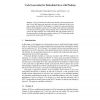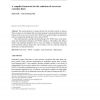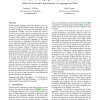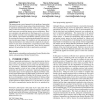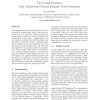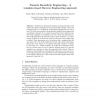119
click to vote
SEUS
2010
IEEE
15 years 11 days ago
2010
IEEE
Abstract. Code generation from models is the ultimate goal of model-based design. For real-time systems the generated code must be analyzable for the worstcase execution time (WCET...
122
click to vote
RTS
2010
15 years 11 days ago
2010
The current practice to design software for real-time systems is tedious. There is almost no tool support that assists the designer in automatically deriving safe bounds of the wor...
140
click to vote
OOPSLA
2010
Springer
15 years 12 days ago
2010
Springer
Domain-specific languages offer high expressive power foa particular problem domain, abstracting over the accidental complexity associated with traditional software development. ...
118
click to vote
SAC
2002
ACM
15 years 1 months ago
2002
ACM
This paper presents a novel approach for the problem of generating tiled code for nested for-loops using a tiling transformation. Tiling or supernode transformation has been widel...
174
click to vote
ENTCS
2007
15 years 1 months ago
2007
Guaranteeing correctness of compilation is a vital precondition for correct software. Code generation can be one of the most error-prone tasks in a compiler. One way to achieve tr...
116
click to vote
ISSE
2008
15 years 2 months ago
2008
The communication and tasking infrastructure of a real-time application makes up a significant portion of any modern embedded control system. Traditionally, the tasking and communi...
159
click to vote
IFIPPACT
1994
15 years 3 months ago
1994
: Advanced architectural features of microprocessors like instruction level parallelism and pipelined functional hardware units require code generation techniques beyond the scope ...
124
click to vote
JVM
2004
15 years 3 months ago
2004
Tools supporting dynamic code generation tend too be low-level (leaving much work to the client application) or too intimately related with the language/system in which they are u...
127
click to vote
SERP
2007
15 years 3 months ago
2007
Model driven code generation has been investigated in traditional and object-oriented design paradigms; significant progress has been made. It offers many advantages including the...
171
click to vote
ECMDAFA
2008
Springer
15 years 3 months ago
2008
Springer
Model driven development suggests to make models the main artifact in software development. To get executable models in most cases code generation to a "traditional" prog...
